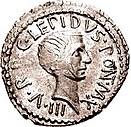Our website is made possible by displaying online advertisements to our visitors.
Please consider supporting us by disabling your ad blocker.
Second Triumvirate
 |
|---|
| Periods |
|
| Constitution |
| Political institutions |
| Assemblies |
| Ordinary magistrates |
| Extraordinary magistrates |
| Public law |
| Senatus consultum ultimum |
| Titles and honours |
 |
| Part of a series on |
| Ancient Rome and the fall of the Republic |
|---|
|
People
Events
Places |
The Second Triumvirate was an extraordinary commission and magistracy created at the end of the Roman republic for Mark Antony, Lepidus, and Octavian to give them practically absolute power. It was formally constituted by law on[1] 27 November 43 BC with a term of five years; it was renewed in 37 BC for another five years before expiring in 32 BC. Constituted by the lex Titia, the triumvirs were given broad powers to make or repeal legislation, issue judicial punishments without due process or right of appeal, and appoint all other magistrates. The triumvirs also split the Roman world into three sets of provinces.
The triumvirate, formed in the aftermath of a conflict between Antony and the senate, emerged as a force to reassert Caesarian control over the western provinces and wage war on the liberatores led by the men who assassinated Julius Caesar. After proscriptions, purging the senatorial and equestrian orders, and a brutal civil war, the liberatores were defeated at the Battle of Philippi.[2] After Philippi, Antony and Octavian took the east and west, respectively, with Lepidus confined to Africa. The last remaining opposition to the Triumvirs came from Sextus Pompey, a son of Pompey the Great, who controlled Sicily, Corsica and Sardinia.
Octavian and Antony were pushed to cooperation, in part by their soldiers, and the triumvirs had their legal arrangement renewed for another five years in 37 BC. Eventually, after Antony's defeat in Parthia and Octavian's victory over Sextus Pompey, Octavian forced Lepidus from the triumvirate in 36 BC. Relations between the two remaining triumvirs broke down in the late 30s BC before they fought a final war, from which Octavian emerged the victor.
- ^ Cadoux & Lintott 2012.
- ^ Goldsworthy 2006, p. 511.
Previous Page Next Page




